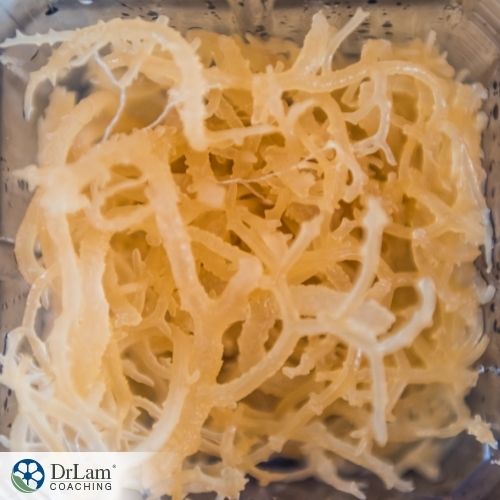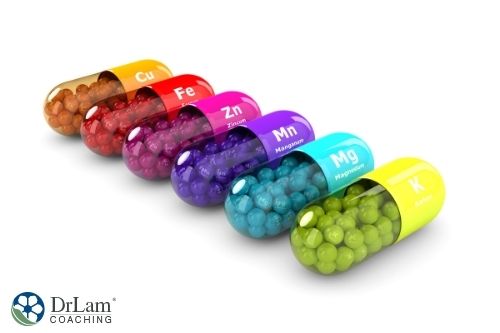 Chondrus crispus, commonly referred to as sea moss or Irish sea moss, is red algae found on shorelines in Europe, North America, and the Caribbean. It is called the Irish sea moss, mainly because for over 2,000 years, people living in Ireland, harvested the micro-algae to make natural remedies for treating various health issues. Nowadays, sea moss, is commercially grown and harvested in pool farms mostly found in Antigua and Jamaica. In New England, carrageenan, a gelatinous carbohydrate, is usually extracted from the sea moss harvested in the area. Carrageenan is used in cosmetics and baked goods.
Chondrus crispus, commonly referred to as sea moss or Irish sea moss, is red algae found on shorelines in Europe, North America, and the Caribbean. It is called the Irish sea moss, mainly because for over 2,000 years, people living in Ireland, harvested the micro-algae to make natural remedies for treating various health issues. Nowadays, sea moss, is commercially grown and harvested in pool farms mostly found in Antigua and Jamaica. In New England, carrageenan, a gelatinous carbohydrate, is usually extracted from the sea moss harvested in the area. Carrageenan is used in cosmetics and baked goods.
Much hype exists about the use of sea moss. Research shows that sea moss has numerous health benefits including boosting your immune system and fight inflammation. As a result, many describe it as a superfood.
If you decide to purchase sea moss, be aware that fake sea moss is also sold in the market. These are manufactured in factories, and usually contain a variety of preservatives that may be harmful to your skin. Instead, make sure that you only purchase 100% natural sea moss containing no preservatives, clearly labeled in the packaging.
While sea moss has been harvested and consumed either as food or healing for thousands of years, there is limited scientific evidence to prove many of these claims. New research into its benefits, shows promise in the ability of sea moss to treat inflammation and related disorders.
Sea moss is very rich in nutrients that are needed by your body to function correctly – 92 out of the 110 minerals from which your body is made, to be more exact. These include, amongst others:
 Vitamin B6 – Also known as folate, plays an important function in blood formation, the conversion of carbohydrates into energy, and DNA and RNA production.
Vitamin B6 – Also known as folate, plays an important function in blood formation, the conversion of carbohydrates into energy, and DNA and RNA production.The nutritional daily value (DV) refers to the percentage of a certain nutrient your body needs on a daily basis. The list below shows the DV of one serving of sea moss, about two tablespoons. Please note that sea moss contains more nutrients than those listed.
| Nutrient | DV % |
| Calcium | 1% |
| Zinc | 1% |
| Magnesium | 4% |
| Phosphorus | 2% |
| Iron | 5% |
| Vitamin C | 1% |
| Vitamin B6 (folate) | 5% |
| Vitamin B2 (riboflavin) | 3% |
| Vitamin K | 1% |
Your thyroid needs iodine to produce thyroid hormones. These hormones, important for proper thyroid function, also play a role in metabolism. They play an important role in heart, muscle, digestive, brain, and bone health. They also help with temperature regulation and weight management.
Your body’s energy levels depend, to a large degree, on the amount of oxygen coursing through it. Iron is found in hemoglobin which carries oxygen to various parts of your body. Interestingly, sea moss has a much higher iron content than chicken and makes a great iron source for vegans and vegetarians.
The various nutrients in sea moss can not only help build muscles and maintain muscle health but also help maintain a healthy bone structure. This is of much importance to those on a strict exercise regime or the elderly who tend to see a loss in muscle and bone mass due to the aging process.
Multiple nutrients in sea moss help improve your immune system function and fight inflammation. Sea moss has wonderful anti-inflammatory, anti-bacterial, anti-viral, and anti-aging properties. The strong antioxidant component in sea moss is largely to thank for this as well as its ability to promote excess sodium removal from the kidneys.
The ability of sea moss to fight inflammation may hold promise for people suffering from all types of inflammatory disorders. This includes anything from the common cold to heart disease to diabetes to digestive health issues to Parkinson’s disease.
Interestingly, studies show that sea moss helps modulate the digestive flora and can stop the growth of the bacteria that causes salmonella. Research shows that sea moss can slow the disease progression of Parkinson’s disease, a condition associated with the aging process in the elderly. Immune system dysfunction and inflammation that may impact neurological processes are synonymous with Parkinson’s.
Consuming sea moss is not the only way to gain its benefits. Used topically in creams, the vitamins and minerals with their strong antioxidant and anti-inflammatory properties may benefit those with a wide range of skin conditions. Included amongst these are acne, eczema, and psoriasis.
As seen, sea moss helps combat inflammation in your body. Your body’s ability to combat inflammation is, however, highly dependent on the state of your adrenal glands and your overall stress levels.
Stress, whether from a physiological, psychological, or external source like pollution, activates your body’s NeuroEndoMetabolic (NEM) stress response, which increases cortisol production in your adrenal glands. This initial cortisol increase is good for you in the short term because it tends to lower inflammation in your body. But then things return to normal once a stressful period passes.
But what happens when the stress continues?
Continued stress results in low level, continuous inflammation because ultimately, your adrenals cannot maintain the prolonged, heightened cortisol production demanded by the NEM. Your cortisol production could eventually fall drastically, with inflammation running rampant.
Prolonged stress and the subsequent immune response, as a result, leads to many health issues including inflammation. So, while inflammation is a natural reaction and good in the short term as it helps deal with anything threatening you, in the long term, it could result in numerous health conditions.
The most common health issues associated with inflammation include high blood pressure, heart disease, diabetes, asthma, Alzheimer’s disease, and cancer, amongst many others.
Sea moss, with its many beneficial properties, may supply adrenal support and help combat the ravages of inflammation. In so doing, it may reduce your risk of many of the health issues associated with inflammation.
 You can find sea moss supplements in most health food stores. Dried sea moss is also an option. The latter it is best consumed prepared in food. You can use it as a thickening agent in most recipes, or add it to soups, stews, baked goods, and even your morning or after-exercise smoothie.
You can find sea moss supplements in most health food stores. Dried sea moss is also an option. The latter it is best consumed prepared in food. You can use it as a thickening agent in most recipes, or add it to soups, stews, baked goods, and even your morning or after-exercise smoothie.
It is important to note that if you have thyroid issues then you should consult a practitioner before using sea moss. Sea moss is rich in iodine, which the thyroid gland utilizes to produce thyroid hormones. However, if your diet is high in iodine, then the gland might get enlarged and cause goiter. So, if you are allergic to iodine or have thyroid issues, then you should talk to your healthcare practitioner before adding making sea moss to your diet or taking supplements. For those who do not have any thyroid-related issues, one serving of sea moss a day is quite sufficient.
If suffering from adrenal fatigue or an inflammatory condition, here are a few things you can do to help alleviate the situation.
Please remember that sea moss has a high iodine content and may not be suitable for those with thyroid issues. Also, before starting to use any supplement for a specific health issue, please talk to your healthcare practitioner first. They are better able to assess whether you would benefit from using it and recommend the correct dosage if necessary.
If you would like to know more about or need assistance with the benefits and use of sea moss or sea moss supplements, the team at Dr. Lam Coaching can help. We offer a free** no-obligation phone consultation at +1-626-571-1234 where we will privately discuss the issue with you. You can also send us a question through our Ask The Doctor system by clicking here.
Sea Moss, with its vast array of nutrients, has great anti-inflammatory (and other) properties that help deal with inflammation. As you may be aware, inflammation and inflammatory health issues are symptoms of adrenal fatigue. So, by addressing inflammation, sea moss may provide adrenal support.
